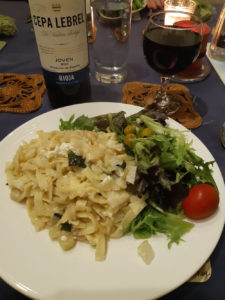 Forgive me for lapsing into pseudo Dickens, but: it was everything I wanted, it was nothing like what I wanted, it was everything I expected, it was nothing like I expected. Let’s be frank. His Majesty’s Starship made me a professionally published novelist and it garnered some good reviews but it wasn’t my key to the big time. I was in no danger of having to make room for a Hugo on my mantelpiece, or indeed having to acquire a mantelpiece to put my Hugo on. The big time was singularly untouched by my presence. In short, it was a bog standard first time novelist’s experience.
Forgive me for lapsing into pseudo Dickens, but: it was everything I wanted, it was nothing like what I wanted, it was everything I expected, it was nothing like I expected. Let’s be frank. His Majesty’s Starship made me a professionally published novelist and it garnered some good reviews but it wasn’t my key to the big time. I was in no danger of having to make room for a Hugo on my mantelpiece, or indeed having to acquire a mantelpiece to put my Hugo on. The big time was singularly untouched by my presence. In short, it was a bog standard first time novelist’s experience.
I’ll come back to where I am now in a moment, but first I think it’s far more interesting to see how a bit of twenty-five-year-old science fiction holds up. In general I think it does so quite reasonably. The Expanse might have more sex and swearing but I maintain my takes on politics, human nature and physics are on entirely the same spectrum. Those reviews still hold true.
But it’s also interesting to look at developments I didn’t expect.
The United Kingdom
My “United Kingdom” is but a virtual construct in the mind of the man who would be King if Great Britain was still a monarchy. Which it isn’t. My thinking was that at some point the geographic British Isles became a republic and were subsumed into a bigger and better sort of European Union. All quite peacefully and democratically done. King Richard takes his riches and sets up shop on the giant asteroid miner UK-1, “the largest spaceship ever built – seventeen massive wheels in space spinning around a common axis. The last redoubt of the exiled House of Windsor.” It has its own Royal Space Fleet and seven thousand four hundred and thirty seven subjects, and is – crucially – recognised as an independent state.
Look, I just wasn’t expecting my fellow citizens to put the electoral gun to their heads 133 years before the novel is set and vote for Brexit. I’m an optimist. I don’t do dystopias.
Artificial intelligence
My first published stories were mostly set in a more or less consistent proto-cyberpunk world – a world of artificial intelligence and networks, written by someone with a naturally wistful turn of phrase, who knew very little about the internet and hadn’t at that point read any William Gibson. However, I knew enough to see no point or purpose in having a consciousness hardwired into a particular physical, mechanical body. In other words, cute as droids might be, they make no sense. It seemed far more likely that intelligence would be virtual, able to operate whatever hardware it was connected to.
I kept this concept for HMSS. I don’t have robots or droids in individual bodies; the intelligence is software, able to roam around in a network or operate its own pro tem mechanical body. The main AI player is Plantagenet, one of a suite of AIs owned by the Royal Family with its own variable and mostly reliable agenda. (Why Plantagenet? Officially, because all the set are named after one dynasty or another. Unofficially, I like the word.) We first meet Plantagenet as the controlling intelligence of an amboid (ambulatory droid, get it?) but later on he exists only as a character in Ark Royal’s network.
I started writing the novel in 1993, delivered the first draft in 1995, saw it published in 1998, and along the way I learned a whole lot more about the internet and networks. Like, how they actually work. That’s really why my AI stories had dried up by the end of the nineties – I didn’t buy them myself anymore, so why should anyone else?
And that is why the AIs themselves were quietly phased out for The Xenocide Mission; you can assume they’re there but they play no significant role.
Handhelds
Related to this – the aide, which I neologise as an acronym for ‘artificial intelligence device’ but which nowadays we would probably call a phone. I didn’t see that coming.
I did see more and more applications coming to roost on a single, handheld device. At the time I didn’t even have a mobile phone of my own, but I knew people who did. And an electronic handheld organiser. And an electronic this, and an electronic that. They would proudly whip them out at a moment’s notice and talk me through them. But all had the same underlying technology inside the casing and so it seemed obvious that they would all eventually converge into one gadget.
I cannot claim to have come up with this insight. If memory serves, you will find the same idea in Arthur C. Clarke’s Imperial Earth, and probably places before that too.
And now … I think even that is passé, or soon will be. I see AI becoming so pervasive that just voicing your wishes within range of an appropriate sensor – which will be pretty well everywhere – will get you what you want. You won’t even have to address it by name: not ‘Alexa’, not even ‘Computer’. This is what I was groping for in Phoenicia’s Worlds, fifteen years later.
Israel
One of my more bizarre fan encounters was with a rabbi from New York, who bought his copy of His Majesty’s Starship at the WH Smith’s on Woking station, where of course all New York rabbis do their shopping. He was intrigued by my use of things Israeli and Jewish, and did some web searching in those pre-Google days to see if I was Jewish myself. He managed to establish that a) I’m not but still b) we overlapped at school. In Dorset. Where all the New York rabbis go to school, of course.
In particular, he called me out on the name of the Israeli ship in the delegation fleet – Adonai. And why not? I thought – it’s a perfectly cromulent Hebrew word. Except that, I’m told, no Israeli government would name a ship Adonai – it’s just too risky. “Adonai” means “Lord” in Hebrew and is read instead of vocalising the Tetragrammaton (the four letters that correspond to YHWH) that make up the Ineffable Name of God. Orthodox Jews will not even say “Adonai”, outside of the context of reading liturgy and Torah, but say instead “HaShem” which means “The Name.” Anything with the name of God on it may not be destroyed but must be buried in the ground in a designated “Geniza.” So you can see the problems of giving that particular name to a spaceship, especially one that might end up in combat.
So now I know.
And where it got me
The dream: being a serious sf author, up there with the best hard sf authors. The reality … Well, not being.
His Majesty’s Starship had been brewing at the back of my mind for years, as the space opera story that I wanted to see out there. Having written it, I then went on to write Wingèd Chariot (re-released as Time’s Chariot), which had been brewing at the back of my mind for years as the time travel story that I wanted to see out there. Then there was The Xenocide Mission, the unexpected sequel to HMSS; and then The New World Order, which had been brewing at the back of my mind for years as the alternate history story that I wanted to see out there. And after that I was out of stories I had wanted to write for years and was having to make up new stuff.
So, I didn’t really know what I wanted to write anymore, and I didn’t really have time to let anything brew at the back of my mind. I had distractions, like unexpectedly finding myself running my own company, which went bust, and equally unexpectedly meeting my future wife, which had a much happier ending, and one way or another the initial rush of my writing career ground to a halt. No one (well, hardly anyone) makes it big on the first novel. You need momentum, and I let the momentum lapse.
And I wouldn’t change it. Accidentally becoming a children’s author led to writing for Working Partners, which kept me afloat financially while my company sank around me. It also led to offers of ghostwriting work when my editor there changed jobs and inherited a series that needed a writer. The ghostwriting accelerated my return to a financial even keel, and ultimately led to the breakthrough contract eight years ago that let me go full time freelance. I’ve written other books since His Majesty’s Starship, and may yet write more, but I owe where I am now to that particular book. So, God bless HMSS Ark Royal, and all who boost at 1g at the head of a constant fusion flame within her.
See also my experiences of writing and publishing the novel:






